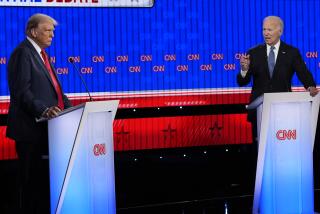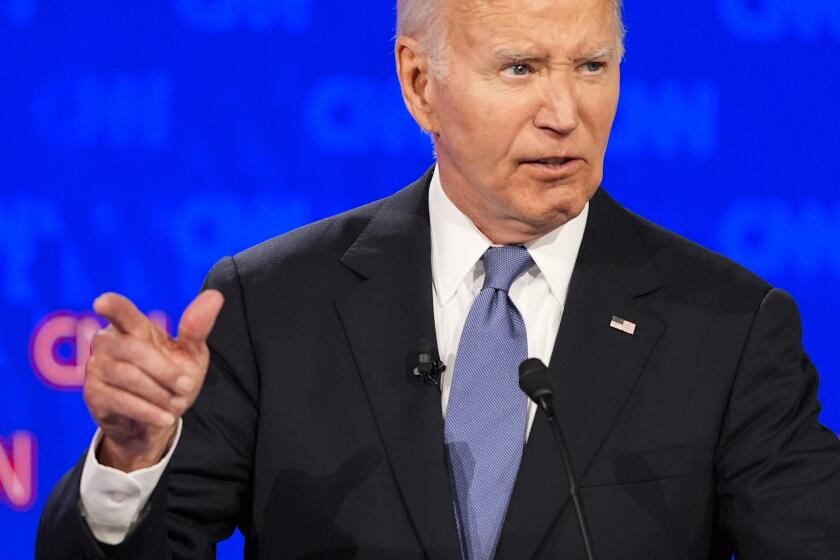Paul Ryan’s budget logic is quandary for some Catholics
JANESVILLE, Wis. — A couple of things were different at 9:45 a.m. Mass at St. John Vianney Catholic Church in Janesville on Sunday. Rep. Paul D. Ryan, a fixture in the center pews when he’s not in Washington or on a national news show, was missing. And reporters were crawling around outside wanting to talk about why.
Ryan was in Charlotte, N.C., waking up as the new Republican candidate for vice president. The 42-year-old, seven-term congressman still made it to a Mass before hitting the campaign trail with running mate Mitt Romney.
“Our father always had us at church on time,” said Tobin Ryan, the congressman’s brother, as he walked out of church. “But each of us grew up to discover our own path. And Paul has certainly chosen his beliefs and a very, very strong value system. It’s an important part of his life.”
Ryan’s religious beliefs have also been an important part of his politics. He often says his faith has guided his positions on social issues, putting him in line with church doctrine on abortion rights and gay marriage. But the former altar boy also cites church teaching in explaining his positions on government spending, deficit reduction and entitlements — the issues that have catapulted his rapid rise.
Such statements have raised the ire of some Roman Catholics who argue the Wisconsin Republican is twisting church teachings on caring for the poor and shielding the vulnerable to justify cutting the social safety net.
Ryan’s ascent onto the ticket throws open this debate — as well as the larger debate between the liberal and conservative wings of the church. Ryan, a conservative who has developed a close relationship with Cardinal Timothy Dolan, a leading spokesman for the conservative church leadership, will face off against another Catholic, Vice President Joe Biden, who supports abortion rights and is aligned with the liberal wing of the church.
There is “definitely a wide philosophical divide between the two,” said Chris Pumpelly, communications director for Catholics United, a lay social justice organization that has been critical of Ryan’s policies. The election “really gives these Catholic swing voters, these cross-pressured swing voters, a lot to think about.”
Overall, Ryan’s record in Congress reflects his conservative stand on social issues. He opposes legal abortion in all circumstances except when the life of the mother is at risk. On this he is more stringent than Romney, who would make additional exceptions for rape and incest — the official position of the ticket. Planned Parenthood’s Action Fund gave Ryan its lowest rating possible for his votes to defund Planned Parenthood and comments against abortion.
Ryan’s record of votes to affirm legal marriage as between a man and woman left him with a similar score from equality advocates at the Human Rights Campaign, the nation’s largest gay rights organization. Even though Ryan did vote for one priority of the gay rights community, an employment nondiscrimination act, he has largely opposed its agenda, including his vote against the repeal of the military’s “don’t ask, don’t tell” policy.
But it is the Ryan budget — with its steep cuts to food stamps, healthcare for children and the disabled, and social programs, while sparing the Pentagon — that has put him at odds with some in his church.
Catholic nuns made a multistate bus tour this summer to bring attention to the harm they say the Ryan budget would cause the poor communities they serve and the “enormous moral choices facing our country.”
In an unusually pointed correspondence, the U.S. Conference of Catholic Bishops urged lawmakers to consider the moral implications of their actions as they prepared to vote on the Ryan budget.
“We join with other Christian leaders in calling for a ‘circle of protection’ around our brothers and sisters at home and abroad who are poor and vulnerable,” the bishops wrote in the spring. They said the “moral measure” of the debate “is not which party wins or which powerful interests prevail, but rather how those who are jobless, hungry, homeless or poor are treated.”
Ryan took on the criticism with a forceful defense of his policies.
“I suppose there are some Catholics who for a long time have thought they had a monopoly of sorts … not exactly on heaven, but on the social teaching of our church,” Ryan said in a speech at Georgetown University. “Of course there can be differences among faithful Catholics on this.”
Ryan argued that debt and the threat it posed to the “idea of America” was a greater danger to the poor than cuts to government. He said his proposals were rooted in the virtues of solidarity and subsidiarity — a Catholic response to communism that encourages decentralized power. And he pushed back at those who criticized him for abandoning the Catholic principle of “preferential option for the poor and vulnerable.”
“Simply put, I do not believe that the preferential option for the poor means a preferential option for big government,” he said.
PHOTOS: Romney selects Paul Ryan
kathleen.hennessey@latimes.com.
Hennessey reported from Janesville and Mascaro from Washington.
More to Read
Get the L.A. Times Politics newsletter
Deeply reported insights into legislation, politics and policy from Sacramento, Washington and beyond. In your inbox three times per week.
You may occasionally receive promotional content from the Los Angeles Times.








